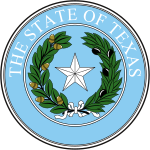
Ralph Webster Yarborough was an American politician and lawyer. He was a Texas Democratic politician who served in the United States Senate from 1957 to 1971 and was a leader of the progressive wing of his party. Along with Senate Majority Leader Lyndon B. Johnson and Speaker of the House Sam Rayburn, but unlike most Southern congressmen, Yarborough refused to support the 1956 Southern Manifesto, which called for resistance to the racial integration of schools and other public places. Yarborough voted in favor of the Civil Rights Acts of 1957, 1960, 1964, and 1968, as well as the 24th Amendment to the U.S. Constitution, the Voting Rights Act of 1965, and the confirmation of Thurgood Marshall to the U.S. Supreme Court. Yarborough was the only senator from a state that was part of the Confederacy to vote for all five bills.

Ralph Moody Hall was an American politician who served as the United States representative for Texas's 4th congressional district from 1981 to 2015. He was first elected in 1980, and was the chairman of the House Committee on Science, Space and Technology from 2011 to 2013. He was also a member of the Committee on Energy and Commerce. In 2004, he switched to the Republican Party after having been a member of the Democratic Party for more than 50 years.
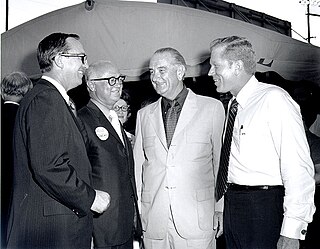
The Sharpstown scandal was a stock fraud scandal in the state of Texas in 1971 and 1972 involving the highest levels of the state government. The name came from the involvement of the Sharpstown area of Houston.
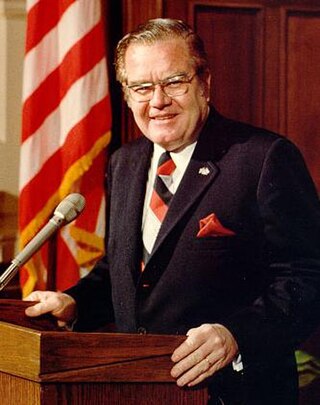
Dolph Briscoe Jr. was an American rancher and businessman from Uvalde, Texas, who was the 41st governor of Texas between 1973 and 1979. He was a member of the Democratic Party.

The Texas attorney general is the chief legal officer of the U.S. state of Texas. The current officeholder, Republican Ken Paxton, has served in the position since January 5, 2015.

The 1978 Texas gubernatorial election was held on November 7, 1978, to elect the governor of Texas. In a surprising upset, Republican Bill Clements was narrowly elected over Democratic State Attorney General John Luke Hill, winning 50% of the vote to Hill's 49%. In doing so, Clements became the first Republican to be elected governor since Reconstruction in 1869.

The 1972 Texas gubernatorial election was held on November 7, 1972, to elect the governor of Texas. Incumbent Democratic governor Preston Smith ran for reelection, but lost renomination to businessman Dolph Briscoe. Smith was overwhelmingly rejected in the Democratic primary, taking fourth place with only 8% of the vote amid the fallout from the Sharpstown scandal. Briscoe went on to win the general election by a relatively small margin, winning 48% of the vote to Republican Henry Grover's 45%. Raza Unida candidate Ramsey Muniz won 6%.
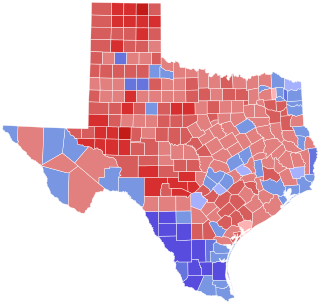
The 1986 Texas gubernatorial election was held on November 4, 1986, to elect the governor of Texas. The election was a rematch of the 1982 election, as incumbent Democratic governor Mark White ran for reelection against former Republican governor Bill Clements. Clements was elected to a second, non-consecutive term as governor, winning 53% of the vote to White's 46%. As of 2024, this is the last time Grimes and Chambers counties have voted for the Democratic nominee for governor.
Peter J. O'Donnell Jr. was an American businessman, securities investor and philanthropist. From 1962 to 1969, he was the Texas Republican state chair. In 1963, he was also the national chair of the Draft Goldwater Committee.

The 2016 United States House of Representatives elections in Texas were held on November 8, 2016, to elect the 36 U.S. representatives from the state of Texas, one from each of the state's 36 congressional districts. The elections coincided with the 2016 presidential election, as well as other elections to the House of Representatives, elections to the United States Senate and various state and local elections. The primaries were held on March 1.

The 1970 Texas gubernatorial election was held on November 3, 1970, to elect the governor of Texas. Incumbent Democratic governor Preston Smith was reelected to a second term, winning 53% of the vote to Republican Paul Eggers' 47% in a rematch of the gubernatorial race of two years earlier. As of 2022, this is the last time Lubbock County voted for the Democratic gubernatorial candidate.

The 1962 Texas gubernatorial election was held on November 6, 1962, to elect the governor of Texas. Incumbent Democratic governor Price Daniel was running for reelection to a fourth term, but was defeated in the primary by John Connally. Although Connally was easily elected, Republican Jack Cox's 46% of the vote was the highest received by any Republican candidate for governor since George C. Butte in 1924.
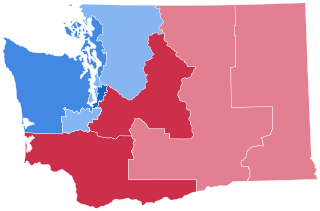
The 2016 United States House of Representatives elections in Washington were held on November 8, 2016, to elect the 10 U.S. representatives from the state of Washington, one from each of the state's 10 congressional districts. The elections coincided with the 2016 U.S. presidential election, as well as other elections to the House of Representatives, elections to the United States Senate, and various state and local elections. The primaries were held on August 2.

The 2018 general election was held in the U.S. state of Texas on November 6, 2018. All of Texas's executive officers were up for election as well as a United States Senate seat, and all of Texas's thirty-six seats in the United States House of Representatives. The Republican and Democratic Parties nominated their candidates by primaries held March 6, 2018. Convention Parties nominated their candidates at a series of conventions. County Conventions held March 17, 2018, District Conventions held March 24, 2018, and a State Convention held April 14, 2018. At the present time there is only one Convention Party in Texas, that is the Libertarian Party. Other parties may seek to achieve ballot access.

The 2026 United States Senate elections are scheduled to be held on November 3, 2026, with 33 of the 100 seats in the Senate being contested in regular elections, the winners of which will serve six-year terms in the United States Congress from January 3, 2027, to January 3, 2033. Senators are divided into three groups, or classes, whose terms are staggered so that a different class is elected every two years. Class 2 senators were last elected in 2020, and will be up for election in this cycle.

The 2022 Texas elections were held on November 8, 2022. Primary elections were held on March 1, with runoffs held on May 24 for primary candidates who did not receive a majority of the vote.
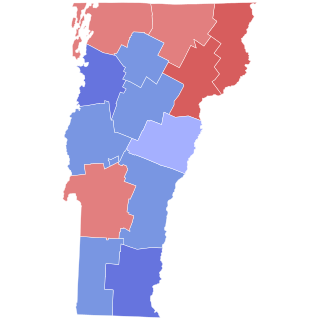
The 2022 Vermont lieutenant gubernatorial election was held on November 8, 2022, to elect the lieutenant governor of the state of Vermont. The election coincided with various other federal and state elections, including for Governor of Vermont. Primary elections were held on August 9. Vermont is one of 21 states that elects its lieutenant governor separately from its governor.

